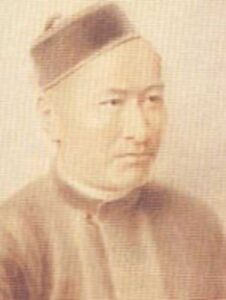
Akylbai Abaiuly Kunanbaev – Kazakh poet, musician, composer, public figure. He was born in the foothills of Shyngystau (now the Abai district of the East Kazakhstan region).
Akylbai was the firstborn of the great Abai and was born when his father was sixteen years old. Akylbai’s mother is Dilda, the first wife of Abai. He was traditionally brought up in the house of his grandfather Kunanbai. He moved on to his father to upbringing in old age Abai. Having spent his childhood and youth somewhat remotely from his great father, Akylbai could not get a Russian education, he studied only in the old Muslim madrasah, had a secondary education of that time. He independently studied Russian and European literature. Akylbai was notable for his rare talent. He was a poet-improviser, musician and composer. He masterfully played the dombra and violin, and he had a composer talant. The people are very fond of and popular “Akylbai’s Song”. The text and music of this work testify to Akylbai’s great talent. Only a few lyrics have been preserved from Akylbai’s poems. Abai had a great influence on the formation of his poetic talent.
Akylbai is the author of three story poems “Zharrah Batyr”, “Dagestan” and “Zulus”, written on the advice of Abai. The manuscript of the poem “Zharrah Batyr” has not been preserved, and the poem “Zulus” has not reached us completely. Only the poem “Dagestan” (“Kissa Zhusup”) has completely reached us.
The first of them – “Zharrah” – is built on the plot of the oriental tale “Seven houses”. But neither the full text, nor its manuscript reached our time. Only the poem “Dagestan” (“Kissa Zhusup”) has reached us, in which he continues the romantic traditions of Byron in Kazakh literature, develops the humanistic principles of Abai, masterfully creating images of courageous and brave people of this region. At the beginning of the poem, Akylbai describes the nature of the Caucasus Mountains. These are live lines of the poem reminiscent of the Abaev translation of Lermontov’s poem “Terek”. Then the poet characterizes the inhabitants of this land – severe, courageous, temperamental people. Colorfully describes the morning dawns in the Caucasus Mountains, where gentle trills of the singer and the messenger of the awakening nature – the nightingale – are heard from everywhere. The poet Murat Sultanbekov from Semei translated the poem “Dagestan” into Russian.
The Akylbai’s poem “Zulus” was based on the plot of the novel by the English writer Henry Haggart “Mines of King Solomon”. The plot of the work is taken from the life of a distant African people. The poet colorfully describes the picturesque nature of the continent, Mount Zulus, the life of natives – elephant hunters. The poem is not fully preserved. The plot of the poem reached us only verbally. Written down by word of mouth, it was published in 1924 on the pages of Sana magazine (Sana, 1924. – 2). All these poems were created by Akylbai in the last years of his life. Akylbai’s works are included in the school curriculum of Kazakh and Russian schools.
Akylbai was a member of the “Society for the Care of Primary Education”, and was also elected volost administrator. Akylbai, vividly showing his poetic talent, passed away at the beginning of the heyday of his work. He died in 1904 on August 1 (August 14) in the city of Semei forty days after the death of Abai. Akylbai’s great noble heart could not stand the greatest emotional pain associated with the death of his beloved father.
List of references:
- Baimagambetova L. Talented children of the great father // Semipalatinskie vesti. 2004. -25 june. – P.4.
- The history of Kazakh literature. Edit by I.Т.Duisenbaeva. In three volume. Second volume. – Аlma-аtа, 1979.- p. 340.
- Silchenko M.S. Creative biography of Abai.- Publishing of Kazakh SSR Academy of Sciences. – Аlma-аtа, 1957. – p. 294.